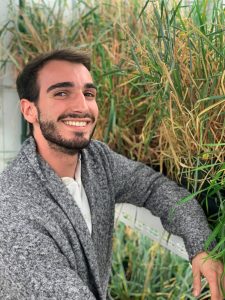Nicholas Karavolias: Plant Physiology First Author

 Nicholas Karavolias, first author of “Paralog editing tunes rice stomatal density to maintain photosynthesis and improve drought tolerance”
Nicholas Karavolias, first author of “Paralog editing tunes rice stomatal density to maintain photosynthesis and improve drought tolerance”
Current Position: Ph.D. candidate, UC Berkeley
Education: Bachelor of Science from Cornell University in Agricultural Sciences with a minor in plant breeding.
Non-scientific Interests: dancing, roller skating, visiting vintage markets, reading literary fiction
Brief bio:
My career in plants began with a love of food and farming. A child of restaurant owners and a grandchild of farmers, agriculture has always been in my narrative. I began exploring my own take on this generational pursuit by conducting research as an undergraduate at Cornell University where I worked in the lab of Susan McCouch. There, I studied rice aluminum tolerance using quantitative genetics approaches. After graduating, I was eager to continue exploring mechanisms to study genetics in crops and was especially eager to make use of the cutting-edge CRIPSR/Cas technology. Shortly thereafter, I found my way to the Innovative Genomics Institute at UC Berkeley, a leading research hub for gene editing, where I have been working on my Ph.D. in plant biology. I have been exploring how gene editing can be applied to crops for climate change adaptation. Our recent publication in Plant Physiology falls within this pursuit as we make use of CRISPR/Cas9 to edit genes associated with stomatal development with the goal of establishing increased drought resilience in rice. Beyond research, I also actively participate in advocacy and education towards the democratization of CRISPR technologies on the global stage. My goal is to enable the use of these tools in establishing a more equitable food system. I am grateful for the support of many incredible mentors, collaborators, and funding agencies in making my career possible.



